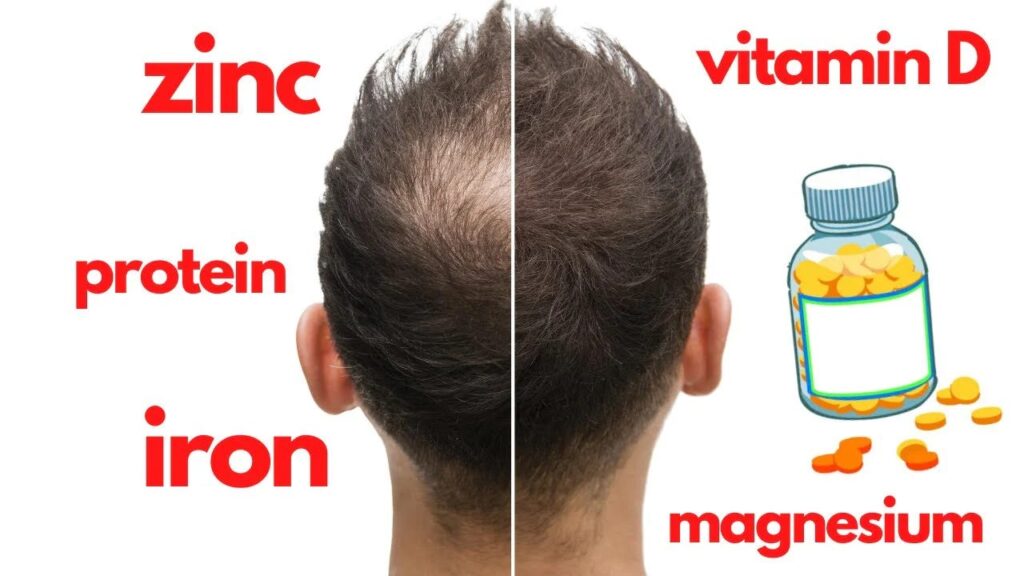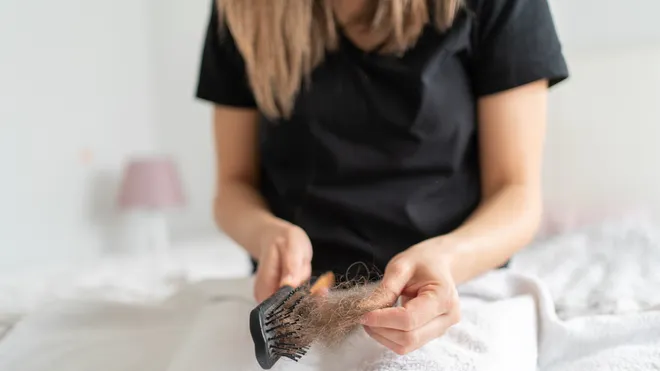Introduction
Hair loss—two words that send shivers down anyone’s spine. Most of us fear it, yet, amazingly, it is quite common. But when you start noticing more hair in your brush, the first thought probably running through your mind would be, “What am I doing to stop this?” That is where vitamins come in. But will a pill make your hair thicker and stronger? The following article will reveal the association between hair loss and vitamins.
The Prevalence of Hair Loss
It’s more common than you think. Millions of people from around the world, both men and women, suffer from it. Statistics show that by age 50, nearly 50% of men and 25% of women have some degree of baldness or thinning hair. But why does this happen?
Why Hair Loss Happens
Causes of hair loss are multiple and complex. It’s not only about what’s happening on the outside of your head but also on the inside of your body. Genetic Factors for Hair Loss
Heredity is one of the major variables that determine whether you will suffer from hair loss. If your parents or grandparents lost their hair at some particular age, the chances are you might, too. Androgenetic alopecia, also known as male pattern or female pattern baldness, is one of the most common causes of hair loss from genetic inheritance.
External Factors That Contribute to Hair Loss
Among the several external factors that can result in hair loss are stress, bad diet, and even some kinds of hairstyles. Telogen effluvium, a condition where your hair would shed more than it’s supposed to, comes with stress. It is as if your hair has finally thrown in the towel, tired of going through so much stress!
The Importance of Vitamins for Hair Health
Now, let’s talk about vitamins. These tiny, yet powerful nutrients, are essential in holistic health and therefore also for your hair. They do their work by producing new cells, promoting blood flow to the scalp, and protecting the hair follicles against damage.

Vitamins for Hair Growth
Not all vitamins are created equal when it comes to hair. Here are the key players:
Vitamin A
It is highly essential for the growth of cells, particularly hair cells. This vitamin A also promotes sebum production in the scalp, keeping your hair moist. However, too much vitamin A can actually trigger hair loss—so balance is essential!
Vitamin B Complex
The B vitamins, especially biotin, are known to promote growth in your hair. They help in the formation of red blood cells, which assist in carrying oxygen and nutrients to the scalp and hair follicles.
Vitamin C
Vitamin C is an extremely powerful antioxidant, hence it works excellent in protecting the hair follicles from damage due to free radicals. It also helps your body make collagen, a protein vital for your hair structure.
Vitamin D
Vitamin D sometimes gets the name “sunshine vitamin” because your body manufactures it when it comes into contact with sunlight. Vitamin D has been linked to hair growth, and other than that, it’s vital for healthy hair follicles.
Vitamin E
It also functions as an antioxidant, protecting the hair from oxidative stress. On top of that, vitamin E supports hair growth by improving blood flow.
What Research Says About Vitamins and Hair Loss
The million-dollar question here is, do vitamins really work to reverse hair loss? There is plenty of research on this topic, and indeed, the results are mixed.
Clinical Studies of Vitamin Deficiencies and Hair Loss
Some studies have associated deficiencies of certain vitamins, such as biotin and vitamin D, with hair loss. But it’s also important to note that these cases were mostly related to severe deficiencies. Most people get enough of these vitamins from a balanced diet.
Do Supplements Work?
While supplements may be useful in the case of a deficiency, taking excess vitamins when you’ve got sufficient levels might not give you Rapunzel-like locks. Taking too much of some vitamins—like vitamin A—can actually cause more harm than good.
The Debate Between Natural and Synthetic Vitamins
Now, the big question is, are natural vitamins from food sources better or do supplement vitamins achieve the same effect?
Which Is Better for Hair Health?
As a general rule, natural vitamins that come from whole foods are better because they have accompanying nutrients that help your body absorb them more effectively. Synthetic vitamins can, however, be useful in case of diet failure. Just bear in mind that they are no magic—especially when hair loss is due to genetics or other health conditions.
How Diet Affects Hair Loss
Your diet determines about ninety percent of the condition of your hair. A diet lacking in essential vitamins and minerals could lead to hair thinning and hair loss.
Vitamins for Improved Hair Growth
Eat foods rich in vitamins A, B, C, D, and E for hair growth. You can consider leafy greens, nuts, eggs, fish, and citrus fruit.
How to Maintain a Healthy Diet for Healthier Hair
Healthy eating ensures that, in general, your body is topped up on all the nutrients it needs every day. Strive for more variety in your foods to cover your vitamin bases.
Lifestyle Habits and Their Relationship with Hair Loss
Other than diet, even lifestyle habits can have their effect on your hair. Stress, smoking, and even excessive styling with heat can damage hair and lead to more hair falling out. So, if you’re serious about keeping your hair, it might be time for a reassessment of some of your habits.
Debunking Myths About Vitamins and Hair Loss
Vitamin and Hair Loss Myths Explained.
There’s a lot of crap flying around when it comes to vitamins and hair loss. Let’s straighten out some of the misconceptions.
The Truth About Over-the-Counter Supplements
So many over-the-counter hair growth supplements make so many miracle claims. However, in reality, unless you are deficient in something, it’s unlikely to do so. Aren’t big doses of vitamins supposed to help?
More does not necessarily mean more. Indeed, taking excess doses of some vitamins can even be toxic to the body and can result in more hair loss than less. Never exceed the recommended dosage.
Signs You Need Professional Help
Sometimes, hair loss signals something more serious. If you’re experiencing a great deal of thinning or actual bald spots, it
